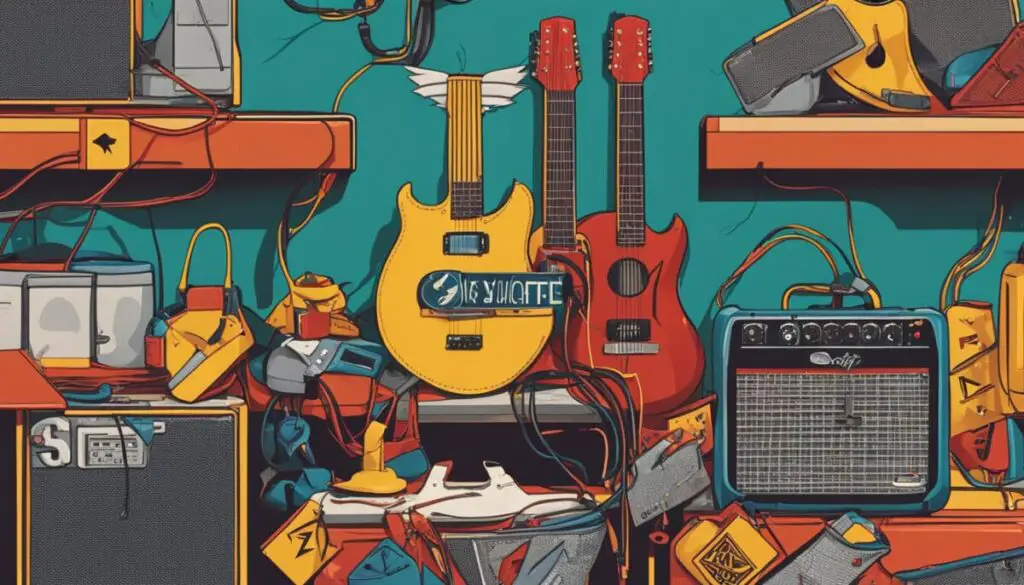When it comes to playing the guitar, many people wonder if there is a possibility of getting electrocuted. While there is a potential for receiving an electric shock, it’s important to understand the difference between a shock and electrocution. Electrocution refers to death caused by an electric shock, whereas a shock from a guitar typically results in discomfort or minor injuries.
To ensure your safety while playing the guitar, it’s crucial to be aware of guitar safety tips and electric guitar safety precautions. By following these guidelines, you can minimize the risk of electric shocks and enjoy your musical journey without unnecessary worries.
Key Takeaways:
- Receiving a shock from a guitar is different from being electrocuted.
- Guitar safety tips and electric guitar safety precautions can help prevent electric shocks.
- Improper grounding, faulty wiring, and broken ground wires can contribute to electric shocks from guitars.
- Regularly check the wiring and connections of your guitar and equipment to identify any potential hazards.
- Avoid touching grounded objects while playing the guitar, especially when using audio equipment.
Causes of Electric Shocks from Guitars
When it comes to electric shocks from guitars, there are several potential hazards to be aware of. One of the most common causes is improper grounding. If a guitar or its components are not properly grounded, it can create a voltage bias that can result in electric shocks. When a player comes into contact with a grounded object, they may experience an uncomfortable shock sensation.
Faulty wiring is another factor that can contribute to electric shocks. In vintage amps, broken or missing ground wires can pose a significant risk. Additionally, improperly grounded outlets can increase the likelihood of electrical accidents while playing the guitar.
To minimize the risk of electric shock from guitars, it is crucial to prioritize guitar amplifier safety and implement proper grounding techniques. Ensure that all electrical connections are secure and correctly installed. Regularly inspect the wiring and components for any signs of damage or wear that could compromise electrical safety.
Implementing effective guitar grounding techniques is also essential. Proper grounding involves connecting the guitar and its components to a ground connection, diverting any potentially dangerous electrical currents away from the player. This can be achieved through various methods, such as using a ground wire and connecting it to a reliable ground or employing shielding techniques to minimize electromagnetic interference.
Staying educated and informed about guitar electrical hazards can help musicians proactively protect themselves and others. By understanding the causes of electric shocks and implementing the necessary guitar safety measures, players can enjoy their instruments while minimizing the risk of electrical accidents.
| Common Causes of Electric Shocks from Guitars | Prevention and Safety Measures |
|---|---|
| Improper grounding | Implement proper guitar grounding techniques |
| Faulty wiring | Regularly inspect and maintain wiring |
| Broken or missing ground wires in vintage amps | Check and repair ground wires |
| Improperly grounded outlets | Ensure proper grounding of electrical outlets |
Prevention and Safety Measures
To avoid electric shock from guitars and ensure your safety while playing, it is crucial to take certain preventative measures. By following these guitar shock prevention tips, you can minimize the risk and enjoy your playing experience without any worries.
1. Proper Guitar Grounding Techniques
One of the key steps to prevent electric shocks is to use proper guitar grounding techniques. Ensure that all your equipment, including the guitar and amplifier, is properly grounded. This helps in dissipating any excess electrical charge and reduces the chances of electric shock. Regularly check the grounding connections and make sure they are secure and functioning correctly.
2. Regular Wiring and Connection Checks
Regularly inspect the wiring and connections of your guitar and associated equipment to identify any faults or issues that could lead to electric shocks. Look for frayed wires, loose connections, or any signs of damage. It is essential to address these problems promptly to maintain a safe playing environment.
3. Avoid Touching Grounded Objects
While playing the guitar, particularly when using a microphone or other audio equipment, it is advisable to avoid touching grounded objects. If you come into contact with a grounded object while playing an electric guitar, there is a higher risk of receiving an electric shock. Stay aware of your surroundings and keep a safe distance from any potential hazards.
4. Use Non-Contact Voltage Tester
Consider using a non-contact voltage tester to check for any potential hazards in backline amps and microphones. This handy device allows you to detect live electrical circuits without direct contact, providing an additional layer of safety when dealing with electrical equipment.

Staying mindful of the potential risks and taking necessary precautions can significantly minimize the chances of receiving an electric shock while playing the guitar. By implementing these safety measures, you can focus on your music and enjoy playing without concerns about electric shock hazards.
Conclusion
While playing the guitar, it is crucial to prioritize safety and take necessary precautions to prevent electric shocks. Understanding the difference between a shock and electrocution is essential. By implementing proper guitar safety tips, such as ensuring proper grounding, checking for faulty wiring, and avoiding contact with grounded objects, the risk of electric shocks can be significantly reduced.
One of the key factors in preventing electric shocks is maintaining proper guitar grounding techniques. It is important to ensure that all electrical connections are secure and that the guitar amplifier and other gear are properly grounded. Regularly checking the wiring and connections for any faults or issues is crucial in minimizing the chances of receiving an electric shock while playing the guitar.
Another important aspect of guitar shock prevention is avoiding contact with grounded objects, especially when using a microphone or other audio equipment. Additionally, using a non-contact voltage tester to check for potential hazards in backline amps and microphones can provide an extra layer of safety. Staying aware of the potential risks and practicing necessary precautions are vital in creating a safe playing environment.
In conclusion, while there is a possibility of receiving an electric shock from a guitar, proper safety measures can significantly reduce the risk. By understanding guitar electrical current and implementing guitar shock prevention techniques, musicians can ensure a safer playing experience. Remember, prioritizing safety is key to enjoying the art of playing the guitar without any unnecessary risks.
FAQ
Can playing a guitar electrocute you?
While playing a guitar, there is a possibility of receiving an electric shock. However, it is essential to understand that being shocked by a guitar is different from being electrocuted. Electrocution refers to death by electric shock, whereas a shock from a guitar can cause discomfort or minor injuries.
What can cause electric shocks from guitars?
Electric shocks from guitars can be caused by factors such as improper grounding, faulty wiring, broken or missing ground wires in vintage amps, and improperly grounded outlets. These factors can create a voltage bias and result in a shock when the player comes into contact with a grounded object.
How can I prevent electric shocks while playing a guitar?
To prevent electric shocks while playing a guitar, it is important to use proper guitar grounding techniques and ensure that all equipment is properly grounded. Regularly check the wiring and connections for any faults or issues. Also, avoid touching grounded objects while playing, especially when using microphones or other audio equipment. Using a non-contact voltage tester to check for potential hazards in backline amps and microphones is also recommended.
What should I know about guitar electrical hazards?
Guitar electrical hazards can include receiving electric shocks if the guitar or its components are not properly grounded. Faulty wiring, broken ground wires, and improperly grounded outlets can contribute to this risk. It is crucial to ensure all electrical connections are secure and that the guitar amplifier and other gear are properly grounded to minimize the risk of electric shock.
How can I stay safe while playing a guitar?
To stay safe while playing a guitar, it is important to practice proper guitar safety tips. This includes ensuring proper grounding, checking for faulty wiring, and avoiding contact with grounded objects. By staying aware of potential risks and taking necessary precautions, the chances of receiving an electric shock while playing the guitar can be significantly reduced.
What are some guitar safety tips for avoiding electric shocks?
Some guitar safety tips to avoid electric shocks include using proper guitar grounding techniques, regularly checking for faults or issues with wiring and connections, and avoiding contact with grounded objects while playing. Additionally, using a non-contact voltage tester to identify potential hazards in backline amps and microphones can help prevent electric shocks.
How can I prevent electric shock from a guitar amplifier?
To prevent electric shock from a guitar amplifier, it is crucial to ensure proper grounding. Make sure all electrical connections are secure and that the amplifier is properly grounded. Regularly check for faulty wiring or broken ground wires in vintage amps. Avoid touching grounded objects while using the amplifier, especially when using a microphone or other audio equipment.
What should I do if I receive an electric shock while playing a guitar?
If you receive an electric shock while playing a guitar, it is important to seek medical attention if necessary. Minor shocks may only cause discomfort, but if there are any signs of injury or severe pain, it is best to consult a medical professional. Additionally, it is recommended to inspect your equipment for any faults or issues that may have led to the electric shock.
How can I ensure the safety of my guitar equipment?
To ensure the safety of your guitar equipment, regularly inspect the wiring and connections for any faults or issues. Ensure that all components and accessories are properly grounded. Use a non-contact voltage tester to check for potential hazards in backline amps and microphones. Avoid using equipment with broken or missing ground wires. By staying vigilant and addressing any safety concerns promptly, you can help prevent electric shocks and other hazards.

